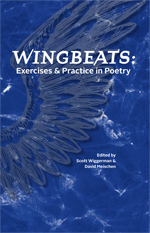 Phoenix College is launching its’ new Creative Writing Facebook page: PC Rising. They want to connect students, professors, and alumni with other writers from the downtown Phoenix area. Follow them @PhxCollegeRising for more information about their students, publications, and upcoming workshops!
Phoenix College is launching its’ new Creative Writing Facebook page: PC Rising. They want to connect students, professors, and alumni with other writers from the downtown Phoenix area. Follow them @PhxCollegeRising for more information about their students, publications, and upcoming workshops!
writing workshops
The Southeast Review’s Writer’s Regimen Program
THE SOUTHEAST REVIEW’S WRITER’S REGIMEN PROGRAM AIMS TO INSPIRE
“Every writer I know has trouble writing.”— Joseph Heller
It’s been said by hundreds of writers hundreds of ways, each more eloquent than the last, and certainly more eloquent than this: writers write. They don’t moan about it. They don’t mow the lawn to avoid it, and they certainly don’t get stuck while doing it—counting the cursor’s every pulse, praying that inspiration will strike, and fearing with every silent second that it never will.
Except, they do. Of course they do.
Despite the proliferation of writing programs in schools across the nation, despite writing groups and conferences and online communities like Fictionaut, Writers Café, and others, there’s no getting around the fact that most writers do the difficult work of generating original material all by their lonesome. And it’s hard work. Sometimes doing it well can seem impossible. But there’s also no getting around the fact that for many of us, writing is our reason for being. It can help to impose meaning on chaos, forge meaningful connections with readers and other writers, and do the necessary work of exploring the possibilities, challenges, and rewards of being human.
At The Southeast Review, we read hundreds of submissions each year. Poems, essays, stories, interviews, book reviews, comics, and everything in between. There are few feelings as wonderful as reading a submission that glimmers from the first word with that special something—a confident voice, striking image, surprising premise, linguistic deftness, or some other distinctive element. It’s hard to predict what kind of work we’ll love because we don’t look for specific kinds of pieces. Rather, we want to be moved, and we are well aware that the works that move us are the result of a writer’s daily struggle against the ticking cursor while she or he molds essays that refuse to cohere, trims bloated stories, and invents language that takes poems past familiarity into a breathtaking newness.
Because we know how hard it can be to face that blank page, we at The Southeast Review developed our Writer’s Regimen Program. Participating writers receive emails for 30 consecutive days full of prompts and exercises applicable for all genres, craft talks from working writers and industry professionals such as poet Matthew Gavin Frank, literary agent Nat Sobel, and memoirist Jillian Schedneck, podcasts of live readings by literary icons like Barry Hannah, Ann Patchett, and Robert Olen Butler, as well as riff words and inspirational quotes designed to ignite any writer’s natural creativity. Each cycle costs only $15 and that entire fee is funneled directly into the production of The Southeast Review. All participants also receive a copy of SER’s most recent issue. We run four cycles per year—two new and two repeats—and our next re-run launches on December 1. To crank up the motivation, we invite participants to submit work at the end of the cycle for a chance at publication on SER Online. You can read the work of our most recent regimen’s winner, Susan Bulloch, here.
Writing may always be a solitary process, and it may never get any easier, but we at SER believe that daily doses of inspiration are the best cure for the writing block blues. If you agree, sign up before December 1 to try out our next cycle, and leave the lawn for another day.
Guest Blog Post, Eileen Cunniffe: Van Morrison and Me
 It’s been a while since I ran out and bought a CD on the day it was released. Not because I buy music online and download it onto something that plugs into my ears. I don’t. It’s just that I already have so many CDs that I’m pretty selective about acquiring new ones.
It’s been a while since I ran out and bought a CD on the day it was released. Not because I buy music online and download it onto something that plugs into my ears. I don’t. It’s just that I already have so many CDs that I’m pretty selective about acquiring new ones.
But I’ve been waiting for the new release from Van Morrison for a few months, ever since I heard its title—Born to Sing: No Plan B. Those words got into my head, and got me thinking about the confidence it would take to substitute “write” for “sing” and claim that as my mantra.
Writing always was my Plan A. Anything else I’ve ever done on the way to becoming a writer, I stumbled into more than sought out, thereby proving—if you follow my logic—that I never had a Plan B.
So here I sit, listening to the 10 songs on the new album (his 35th!) for the third time in as many days. “Born to Sing” isn’t even my favorite track. I mean it’s still Van Morrison warbling and doing that thing he does with his saxophone, making me sway and swoon over my keyboard. It’s that idea of “No Plan B” I’m stuck on. I can’t help wondering how long he’s felt that way—since before his first album? Or maybe after his 10th?
“No Plan B means this is not a rehearsal,” Van explains in the liner notes. “That’s the main thing—it’s not a hobby, it’s real, happening now in real time.”
By that definition, I am indeed working my Plan A—in the odd hours outside my day job in a nonprofit arts agency, the one that pays the bills. It’s a job I really like, mind you—in part because it brings me into contact with other people who have given themselves over entirely to their art-making. But I take paid vacations to go away and write. I write on weekends, I write in the evenings, I scribble notes to myself on the train, I squeeze in courses and workshops whenever I can.
I’ve never thought of writing as a hobby. It’s real, all right; it’s one of the real-est parts of me. So what if I was nearly 50 before Plan A kicked in and my writing life began in earnest? There’s no turning back now, I’m certain of that.
And yet, I have my doubts. Would I, if I could, give myself over entirely to my writing? “Passion’s everything/When you were born to sing,” sings Van. Does my passion for writing run that deep, spring from a “sense of absolute conviction” (again, the liner notes)? Or is it fueled by a sense of urgency because I have to fit in around the margins of my other life?
Of course, Van Morrison has been making music forever. He’s allowed to exude utter confidence, and he’s got the resumé to back up his claim that he never had (or needed) a Plan B. And clearly, he doesn’t have to worry about a day job.
Advice from Wingbeats Co-Editor, Scott Wiggerman

If writing better poetry is on your list of New Year’s resolutions, then you’ll want to take a look into Scott Wiggerman and David Meischen’s new book, Wingbeats. Wiggerman and Meischen, an SR contributor from Issue 7, have compiled the wisdom and advice of 58 poets in order to create exercises that showcase the poetry writing process.
As a poet and former Poetry Columnist for the Texas Writer, Scott Wiggerman is no stranger to the world of poetry. He has conducted a number of workshops for the WLT Poetry Study Group and his work has been nominated for a Pushcart Prize.
Wiggerman found he kept returning to poetry staples, like The Practice of Poetry (edited by Robin Behn and Chase Twichell), for reference, but what he really needed was something new that applied the same variety of techniques. Wiggerman writes that he was looking for something that “combined exercises and essays by poets who actually teach, both academics and non-academics, this time. Since it didn’t seem to be forthcoming from anywhere, I asked my partner about creating and publishing such a book. I foolishly thought it would be a project that I could handle alone, but David came on board as co-editor almost immediately, thank goodness!”
From the simplest activities to the more involved tasks, Wingbeats provides aspiring poets with exercises along with real poems that show what these look like in action. “We wanted to create a book that poets would actually use, and I wanted a book that would work well for poets both in MFA programs and those, like myself and several of our Wingbeats contributors, who learn the craft of poetry on their own or through the occasional workshop,” wrote Wiggerman.
Wiggerman and Meischen’s new book not only covers standard poetic techniques, but also new strategies for revision, collaboration, and inspiration. If you’re looking for some hands-on experience in writing poetry, Wingbeats is a great resource.
Wiggerman also recommends that aspiring poets seek out workshops and writing groups for guidance: “The absolute best way to learn how to write is to write–and many books or MFA programs can ‘teach’ you this. But it takes feedback as well, and for this, one needs someone to share his or her work with. Of course, it also helps tremendously to read poetry. One of the adages of writing is to ‘show, don’t tell,’ and while Wingbeats does tell, it also shows through poem after poem. It’s the way I like to teach my workshops, letting poems speak for themselves by showing how they’re done.”
You can learn more about Wingbeats on the Dos Gatos Press website or on their new Facebook page.
Resources for the Thrifty Writer
Workshops are a great resource for amateur and professional writers alike. They are a place to test first drafts and refine sixth and seventh revisions. However, not everyone has the time or the resources to attend workshops. Most workshops have at least a nominal fee, and some can range to the thousands.
A new trend has been emerging on the internet to rectify this problem: online workshop forums. Websites like Writing.com connect amateur and professional writers from around the world who read and review each others’ portfolios. This particular website allows each writer to post 10 items to his or her portfolio, provides a customized domain and even an email address–all for free.
For those who prefer to have a more intimate workshop experience, perhaps with writers they know personally, freeforums.org is another alternative. On this site, anyone can create a forum on any topic and regulate forum membership. Writers have used this online tool to create workshop forums, like this one created by an ASU Creative Writing student, which are free to all users and easy to navigate.
For writers who lack spare time and extra cash, online workshop forums are an accessible way to get feedback on their work.
